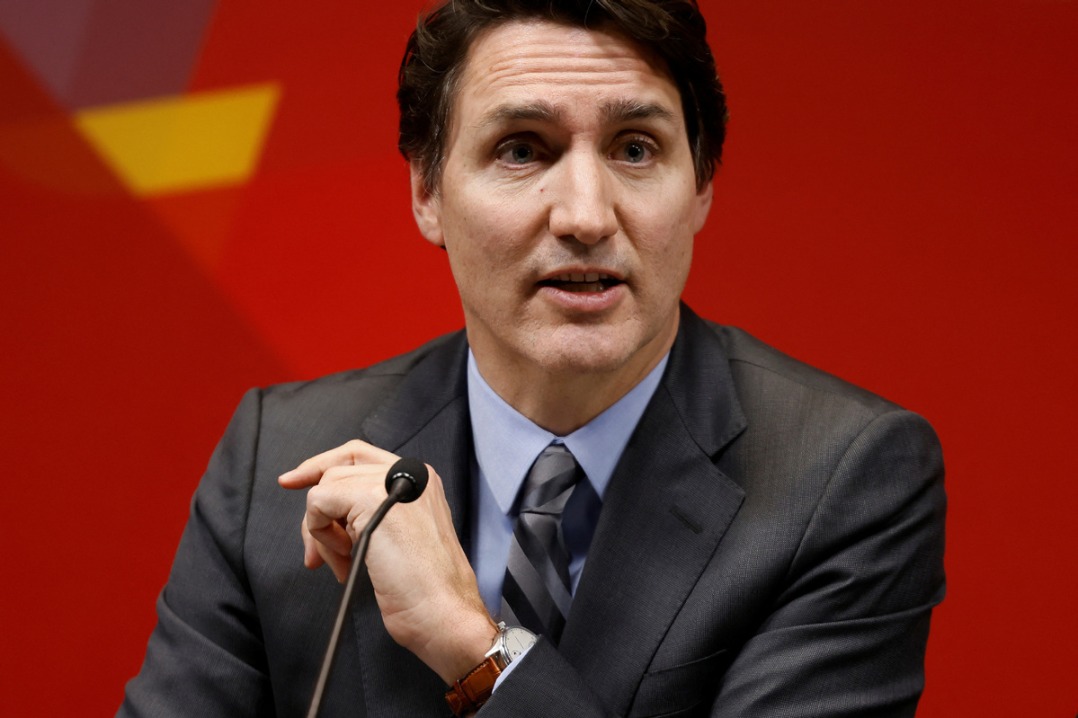Systemwide approach to fight climate change urged


The year 2024 marks the 80th anniversary of the Bretton Woods institutions, which came into being after World War II to regulate international economic flows. The international financial institutions have helped enable periods of high growth, fueled by the expansion of globalization in goods, services, information and people-to-people exchanges, which have benefited large chunks of the world's population.
Most countries have benefited from economic growth and large parts of the population have been lifted out of poverty in China, India and Indonesia. However, financial crises have also occurred during this time, leaving many in the clutches of penury.
Three challenges currently threaten the 80-year record of rising global living standards and poverty reduction. First, it is widely recognized that the crisis in the global commons, the term encompasses cross-border challenges that do not fall under national jurisdictions, such as climate, pandemic and technology, are having an increasingly negative impact on the global economy.
Second, these challenges risk becoming even more urgent without effective collective action over time. Third, despite this recognition, most people agree that progress in addressing the issues has been too little and too slow.
What are the reasons that have stopped the global economic architecture from acting in time and at scale? First, the challenges in managing the global commons have grown more numerous and more difficult, with climate change perhaps being the most pressing issue. Second, the global economy has become more fragmented, and geopolitical tensions have increased, making collective action difficult.
After decades and decades of supportive geopolitics, demographics and advances in technology, many of the positive trends are now being reversed. Moreover, the tailwinds to global growth, such as growing markets, increasing trade, expanding supply chains, and financial globalization were disrupted by the COVID-19 pandemic.
Strategic competition and geopolitical tensions have been inevitable fallouts of armed conflicts, exaggerating this fragmentation. The conflict in Ukraine has ruptured the rules that govern the international order. International cooperation is at its lowest point since the Cold War. The peace dividend has evaporated as defense spending has risen across the globe. These developments have increased political tensions leading for a rush for food, energy, security, near assuring of supply chains and the adoption of protectionist policies.
However, the cost of fragmentation is high. Depending on how it goes, the IMF estimates that it is somewhere between 2 percent to 7 percent of GDP. Many economic forecasts show that in the next 30 to 40 years, about two thirds to three quarters of global growth will come from the Global South. However, these countries will be devastated by adverse climate changes.
So the challenge is, how can we keep global growth up in a situation where the countries that are supposed to grow are also facing the strongest headwinds? That is a governance issue that needs to be tackled by the official sectors because it is hard to have a collective movement forward where the governance of the institutions does not reflect the realities.
China plays a significant role in the fight against climate change. On one hand, China's growth is critical for the growth of Asia and of middle and low-income countries. On the other hand, China has made tremendous progress on the emission front and in devising a market and a taxonomy for dealing with climate change. That is something that other countries can learn from.
The private sector is key to solving climate change challenges. All estimates of needed financing are in the band of $3 trillion to $4 trillion annually, the bulk of which is supposed to come from domestic revenue mobilization and foreign direct investment.
Therefore, there is merit in identifying the specific shortcomings in the entire system, public and private, that are impeding progress. With respect to climate specifically, three gaps exist in both the public sector and in the private sector. These are gaps in governance, implementation and accountability.
And finally, despite the existence of the UN Framework Convention on Climate Change, there is no institution that has the overall responsibility to coordinate the global climate change policy and system wide financial effort. A reform of the global financial system is urgently needed to assess and coordinate the necessary financing, as well as fiscal policies.
The first question that comes up is, do we need a new institution to close the gap? In today's geopolitics, it will be very hard to reach a consensus on a new institution's role, charter and funding. Even if we reach an agreement on a new institution, it will take at least a decade for the institution to gain the necessary scale and expertise to make an impact.
Also, technical advances over the last few decades have improved the feasibility of making rapid progress. In particular, innovation has dramatically improved the economics of reducing carbon emissions. Thus, the problem is no longer whether it's technically feasible to stabilize and then bring down global carbon emissions, but, instead, how to do it quickly, equitably and at scale. It means that the focus needs to shift toward coordinating actions that will help set priorities for mitigation and adaptation and mobilize financial resources. The private sector can contribute effectively to meet these challenges.
Two key instruments are needed to encourage the private sector's participation. One is the global carbon trading schemes that facilitate increase in voluntary compliance, the integration of nature-based solutions in the form of decarbonization plans and the introduction of carbon taxes, including cross-border adjustments, together with appropriate policies that would help middle- and low-income countries.
The IMF and the World Bank should help support the development of global carbon markets and assist in the development of carbon taxes and mechanisms. A regime that allows the real price discovery of carbon in advance and developing economies would be essential for the ecosystem to develop.
Finally, on the accountability side, the current system of voluntary disclosures enforced by shareholder action is not manageable. The framework fails to verify the consistency of corporate disclosures with the corresponding financial statements. Market regulators should verify the consistency of mandatory sustainability disclosures with the corporate financial statements and monitor divestment policies that shift high emission activities to lesser regulated jurisdictions.
Climate change is the single largest threat that faces the global community. Critical gaps in governance, implementation, and accountability need to be bridged to solve this crisis. Neither the public sector nor the private sector can resolve the impasse alone. We need a system-wide approach to move forward.
The author is vice-chairman of the International Finance Forum and former chief representative for Asia and the Pacific at the Bank for International Settlements. The views do not necessarily reflect those of China Daily.

































